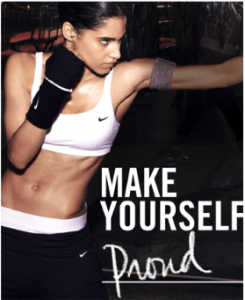The representation of women over time have changed vastly in advertisements, from the obedient housewife persona from the 20th century, to the now present independent equal-footing depiction of women in media.
The first panel displays an advert which aimed to boost female worker morale and encourage contribution to the industrial sector during WW2 America. The advertisement is a clear example of the control which social norms and stereotypes have over representation in media, although meant to display a strong working woman, the female character in the ad still conveys the values of that era. The headgear which the woman wears is befitting of a housewife, conveying the idea that although he/she is ‘strong’, she is still a homeworker at heart, and is not on equal footing as other men. In addition, the usage of the word ‘We’ in the slogan ‘We Can Do It!’ denotes that women can only achieve this through collective effort, and are otherwise weak when independent, further enforcing the stereotype that women are dependent beings.
On the other hand, the modern ad uses the word ‘Yourself’ instead of a plural pronoun, this conveys a value that contradicts that which was shown in WW2 advert, the idea that you should be striving for improvement to satisfy yourself, and not others. In comparison, the modern ad also gives the impression that being a ‘strong’ woman is more to do with fitness and ambitions, whilst the WW2 advert gives the impression that women need to be stronger for the purpose of manual labour. This shows the contrast between the values which were assumed regarding women, in the 20th century, it was assumed that women had no desire to become ‘strong’, and only did so due to external circumstances; however, modern era women do so through personal choice. This has been represented through their attire and posture, in the first advert, the woman is fully clothed in work clothing while the second advert features a woman donning sports attire, signifying that her dedication is due to personal satisfaction such as fitness or appearance etc.
The WW2 advert reflects the identity of women in that era, women were encouraged to join the workforce, but nevertheless, are still subpar to men and did not independently strive to become ‘strong’. Contrary, the present-day ad attempts to challenge the out-dated identity of women and enforced the modern idea that all are equal. Through these two ads, you can see how the values and expectations of women have changed over the generations; similarly, the social norms and perspective that the current society has on certain subjects may also follow a similar path. Things which we would least expect to be viewed in a negative light may not stand beside the same opinions it receives today. The state of social structures can never be guarenteed as ‘right’ or wrong’ as they are all suceptable to change, these adverts, being a clear example.








